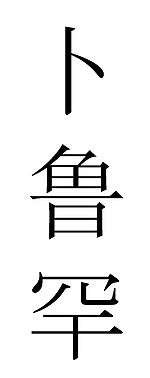Buluqhan Khatun


Buluqhan Khatun (died ca. 1286) (lit. "Queen Buluqhan"), also Bulughan, Bulukhan, Bolgana, Bulugan, or Zibeline for Marco Polo (Chinese language|Chinese: 卜鲁罕), was a 13th-century Mongol princess, and the principal wife of the Mongol Ilkhanid ruler Abagha (1234–1282). She belonged to the Mongol tribe of the Bayaut (also Baya'ud, Chinese: 伯牙吾). Her name 'Bulughan' means 'sable' in Mongolian language.
Though childless herself, she raised her step-grandsons (by Abagha's son Arghun) Ghazan and Öljeitü, both of whom later succeeded Arghun, and eventually converted to Islam. Arghun had Öljeitü baptized at birth, and gave him the name "Nicholas" after Pope Nicholas IV.[1]
When Bulughan died in 1286, her husband Arghun asked Kublai Khan to send him one of Bulughan's relatives as a new bride. The choice fell to Kökötchin ("Blue, or Celestial, Dame"), who was escorted by Marco Polo on her journey from Kaan-baligh (Beijing). The party traveled by sea, departing from the southern port city of Quanzhou and sailing to Sumatra, and then to Persia, via Sri Lanka and India. They arrived in 1291; however, Arghun had been killed before her arrival by conspirators, so Kökötchin married Arghun's son Ghazan, becoming his principal wife.[2]
Notes
- ↑ "Arghun had one of his sons baptized, Khordabandah, the future Oljaitu, and in the Pope's honour, went as far as giving him the name Nicholas", Histoire de l'Empire Mongol, Jean-Paul Roux, p.408
- ↑ The Travels of Marco Polo